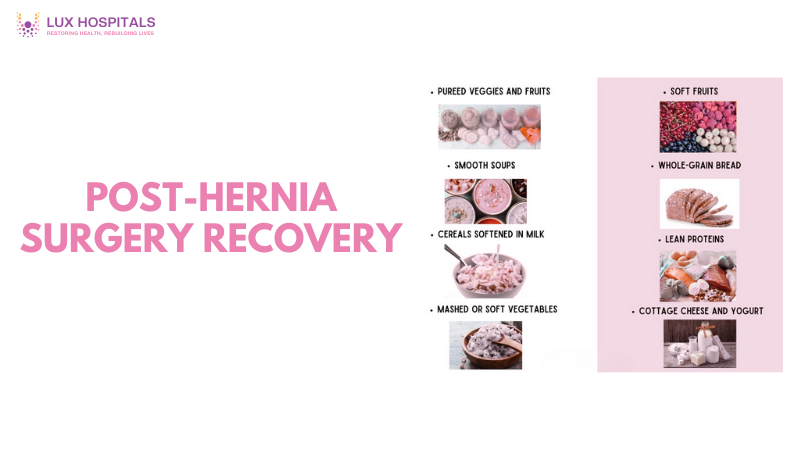Post-Hernia Surgery Recovery: Diet, Exercise and Care Tips

It takes time, patience, and attention to your body’s needs to recover from hernia surgery. Your recuperation is essential to avoiding recurrence and regaining strength, regardless of whether you have had abdominal, umbilical, or inguinal hernia surgery.
In this blog, we’ll guide you through essential aspects of hernia surgery recovery, including diet after hernia surgery, safe exercises, and self-care tips, to help you heal faster and feel better sooner.
What to Expect After Hernia Surgery?
After hernia surgery, it’s normal to experience mild discomfort, swelling, or a feeling of tightness in the operated area. This is especially common in the first few days. Everyone’s recovery time from hernia surgery is slightly different, depending on the type of hernia, the surgical method (open vs. laparoscopic), and overall health.
Most people return to light activities within a week, but complete recovery from hernia surgery may take 4–6 weeks. It’s important to follow your surgeon’s instructions closely and avoid straining your body too soon.
Diet After Hernia Surgery: What to Eat and Avoid?
Your hernia surgery recovery diet is critical to the healing process. Eating the right foods can reduce bloating, ease bowel movements, and prevent straining, one of the most significant risks for hernia after surgery.
Recommended Foods:
- High-fibre foods: Whole grains, oats, fruits (like papaya and apple), and vegetables (like spinach and carrots) help prevent Constipation.
- Lean proteins: Chicken, eggs, tofu, and lentils support tissue repair.
- Probiotics: Yoghurt or fermented foods aid digestion and gut health.
- Hydration: Stay hydrated and soften stools by drinking lots of water.
Foods to Avoid:
- Heavy, greasy meals: These can slow digestion and cause bloating.
- Carbonated drinks: Can lead to gas and abdominal discomfort.
- Spicy foods: May irritate your digestive tract early in recovery.
Sticking to a gentle, nutritious hernia surgery diet in the first few weeks will ease discomfort and reduce the chance of complications.
Safe Physical Activity During Hernia Surgery Recovery
Exercise is essential for a smooth hernia surgery recovery, but timing and intensity matter.
First Week:
- Rest and short walks around your home are enough. Walking improves blood flow and helps prevent blood clots.
- Avoid lifting anything heavier than a kettle.
Weeks 2–4:
- Gradually increase your walking distance.
- Add light stretching—but skip any core or abdominal exercises.
After Week 4:
- With your doctor’s approval, you can start gentle bodyweight exercises like wall push-ups or light yoga.
- Avoid heavy lifting, crunches, or running until you’re cleared these could risk another hernia after surgery.
Remember, hernia surgery recovery time can vary. Always listen to your body and avoid rushing the process.
Tips for a Smooth Hernia Surgery Recovery
The simple routines shown below can significantly improve your recovery:
1. Take your medications as prescribed.
Controlling pain is essential, especially in the beginning. As directed, take prescription medications to maintain your comfort and abilities.
2. Put on comfortable, loose clothing.
Belts and tight jeans should be avoided since they may cause irritation to the surgical site.
3. Avoid Constipation
A fibre-rich hernia surgery recovery diet and adequate water intake can help. If needed, ask your doctor about stool softeners.
4. Support the Surgical Site
Use your hand or a small pillow to support your belly when coughing or sneezing.
5. Attend Follow-Up Appointments
Your surgeon will keep an eye on your recuperation and offer you personalized guidance.
When to Contact Your Doctor?
Even if you’re following all the recovery tips, staying alert for warning signs is essential. Contact your doctor if you notice:
- Fever over 100.4°F
- Increased swelling or redness at the incision
- Difficulty urinating or bowel movements
- Persistent or severe pain
- Signs of a hernia after surgery, such as a bulge near the original site
Early medical intervention can guarantee appropriate healing and avoid problems.
Conclusion
With the right care, most people recover completely following hernia surgery and return to their normal activities, even though recovery takes time. Following a balanced diet, exercising with caution, and paying attention to your body are the best ways to prevent a recurrence after surgery for a hernia.
If your symptoms are getting worse or you’re worried about how long it will take to recover from hernia surgery, don’t be afraid to call your doctor. You are getting closer to a stronger, pain-free tomorrow with each action you take today.
Frequently Asked Questions
Hernia surgery recovery time typically ranges from 4 to 6 weeks. However, recovery may be quicker for laparoscopic procedures and slower for open surgery. Your doctor will provide you advice depending on your unique situation.
A proper diet after hernia surgery should include high-fibre foods, lean proteins, and plenty of fluids to avoid Constipation. In the early days, avoid greasy, spicy, and carbonated foods.
Yes, gentle walking is encouraged within 24 hours of hernia surgery to improve circulation and reduce the risk of blood clots. Until your doctor gives the all-clear, refrain from strenuous exercise or heavy lifting.
It depends on your job. Most people with desk jobs return within 1–2 weeks, but physically demanding work may require up to 4–6 weeks of hernia surgery recovery time.
Yes, mild bloating and discomfort are common during the early recovery period. Following a gentle hernia surgery recovery diet can help ease symptoms.
Watch for swelling, pain, or a bulge near the surgery site. If you suspect a recurrence, consult your doctor promptly to evaluate the possibility of a hernia after surgery.
Light walking and stretching are safe during the first few weeks. However, avoid core workouts, heavy lifting, and high-impact activities until your doctor gives you permission.
While a specific hernia surgery diet is most important during the initial recovery phase, maintaining a fibre-rich, balanced diet long-term can help prevent strain and reduce the risk of recurrence.




















